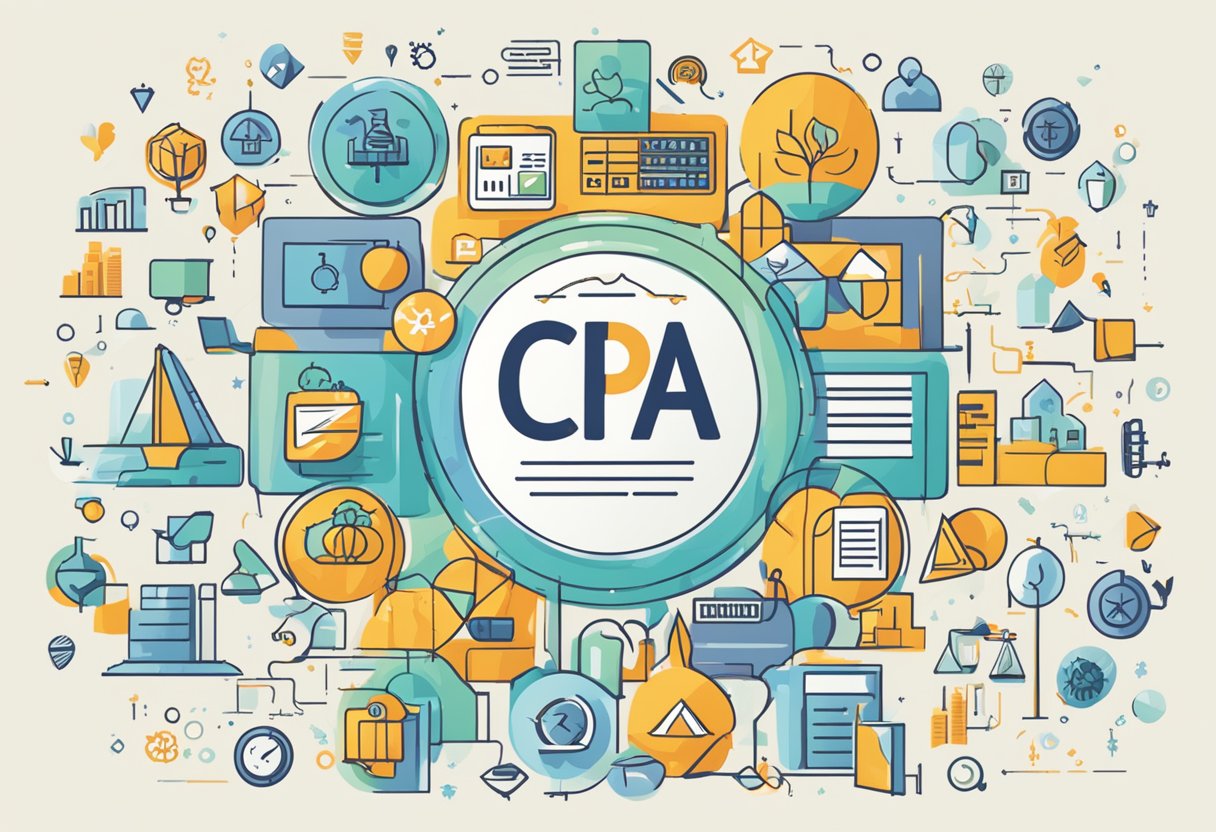A CPA, or Certified Public Accountant, is a professional designation that signifies expertise in accounting, finance, and tax-related matters. To earn the CPA title, individuals must meet education requirements, pass a rigorous examination, and fulfill a certain amount of relevant work experience. This certification is recognized globally and is often considered a symbol of high ethical standards and professional competence in the field of accounting.
Certified Public Accountants are entrusted with the responsibility to protect the integrity of financial reporting. They perform a wide array of services that include but are not limited to, auditing financial statements, tax planning and preparation, business consulting, and financial planning. Their role is critical in helping businesses comply with laws and regulations, thus ensuring transparency and trustworthiness in financial practices.
The path to becoming a CPA is demanding, reflecting the importance of the role CPAs play in the financial sector. Once accredited, they are required to adhere to a strict code of professional conduct and pursue continuing education to keep their skills and knowledge current. This continuous commitment to excellence allows CPAs to contribute significantly to the financial stability and success of individuals and businesses alike.
Understanding CPA: Definition and Scope
A Certified Public Accountant (CPA) is a designation provided to licensed accounting professionals. The CPA credential is a symbol of trust and professionalism in the field of accounting. This section will provide an insight into the historical origins of the CPA designation and outline the primary roles and responsibilities associated with it.
Historical Background of CPA
The CPA designation emerged as a distinguished title in the early 20th century. It was created to establish a standard of proficiency in accounting practices, following the development of financial markets and increased public interest in reliable financial information. In 1896, New York became the first state to legislate the CPA qualification, setting a precedent for other states and countries to implement similar licensing requirements.
Roles and Responsibilities
Certified Public Accountants are responsible for a wide array of pivotal tasks within the realm of financial accounting, auditing, tax preparation, and consulting.
- Financial Accounting: CPAs play a crucial role in preparing and examining financial records, ensuring accuracy and compliance with laws.
- Auditing: They perform audits by verifying the financial statements of corporations, government entities, and nonprofits.
- Tax Preparation: Tax services include preparing and filing tax returns, as well as navigating the complexities of tax law.
- Consulting: In consultancy, CPAs provide expertise on financial management and strategies to improve efficiency.
Through these responsibilities, CPAs have a profound impact on the integrity and reliability of financial information in various sectors.
The Path to Becoming a CPA

To become a Certified Public Accountant (CPA), candidates must fulfill specific education requirements, pass the Uniform CPA Exam, gain relevant experience, and commit to ongoing learning through continuous education for maintaining their license.
Education Requirements
A bachelor’s degree is the foundational education requirement for aspiring CPAs. This degree typically consists of 120 semester hours, with a major in accounting or a related field. However, most states require 150 semester hours of college coursework for CPA licensure, which can be met through a combination of a bachelor’s degree and additional graduate-level education.
- Bachelor’s Degree:
- Major in accounting or related field
- 120 semester hours
- Additional Education:
- Often a graduate degree or extra courses
- Totaling 150 semester hours (common requirement)
Uniform CPA Exam
The Uniform CPA Exam is a pivotal component in the CPA certification process. It tests a candidate’s knowledge and skills in accounting and is administered by the American Institute of Certified Public Accountants (AICPA).
- Key Exam Features:
- Four sections: Auditing and Attestation (AUD), Business Environment and Concepts (BEC), Financial Accounting and Reporting (FAR), and Regulation (REG)
- Computer-based format
- Administered in testing centers
- Preparation:
- Intensive study
- Review courses recommended
Experience Requirement
After passing the exam, candidates must fulfill an experience requirement to demonstrate practical knowledge in accounting. The specifics of this requirement vary by state, but they typically include a minimum number of years working under the supervision of a licensed CPA.
- Experience Criteria:
- Duration: 1-2 years (varies by state)
- Supervision: Must be under a licensed CPA
- Field: Public accounting, industry, or government roles
Licensing and Continuous Education
Obtaining the CPA license is the culmination of meeting all prior requirements. CPAs must then uphold their credential through continuous education, ensuring their skills and knowledge remain current with industry developments and regulations.
- Licensing:
- State-specific
- Requires application post exam and experience
- Continuous Education:
- Required to maintain CPA license
- Varies by state (commonly 40 hours per year)
CPA Exam Breakdown

The CPA Exam is a comprehensive test that assesses the knowledge and skills of aspiring public accountants in various critical areas. The exam is uniform nationwide, ensuring consistent standards in the accounting profession.
Exam Format and Components
The Uniform CPA Exam comprises four sections, each focusing on a distinct aspect of accounting knowledge and practice. Candidates must pass all four sections to obtain their CPA licensure. The sections are as follows:
- Auditing and Attestation (AUD): Tests the candidate’s ability to audit and attest in various work contexts, including adherence to standards and ethics.
- Business Environment and Concepts (BEC): Evaluates comprehension of general business concepts and the importance of a CPA’s role within a business environment.
- Financial Accounting and Reporting (FAR): Focuses on the principles and procedures involved in financial accounting and the preparation of reports.
- Regulation (REG): Covers federal taxation, ethics, professional responsibilities, and business law.
Each section consists of multiple-choice questions and task-based simulations designed to assess practical skills. The FAR, AUD, and REG sections each contain 8 task-based simulations, while the BEC section includes 4 simulations and 3 written communication tasks.
Study Resources and Strategies
Candidates preparing for the CPA Exam should employ targeted study resources and strategies to optimize their chances of success. Resources widely regarded as beneficial include:
- CPA Review Courses: Many courses are tailored specifically to cover the breadth of exam material and help reinforce understanding.
- Practice Exams: Simulated exams provide insight into the test format and help candidates build test-taking strategies.
Effective strategies for exam preparation often include:
- Structured Study Plan: A consistent, well-paced approach that allocates sufficient time to each exam section is crucial.
- Understanding the Blueprints: The American Institute of CPAs (AICPA) provides exam blueprints that outline the specific knowledge and skills tested, which can guide a candidate’s study focus.
By leveraging these resources and employing diligent study habits, candidates can approach the CPA Exam with confidence.
State Requirements and Regulation
To become a Certified Public Accountant (CPA), candidates must meet specific requirements set by their state’s Board of Accountancy. These regulations and licensing requirements are crucial for maintaining the integrity and professionalism of the accounting field.
Board of Accountancy
Each state has its own Board of Accountancy responsible for the licensing and regulation of CPAs. These boards establish and enforce educational, experience, and examination requirements that must be satisfied for an individual to become licensed as a CPA. The National Association of State Boards of Accountancy (NASBA) helps to unify and guide these state boards though policies may vary from state to state.
- Function: The state board of accountancy oversees the CPA licensing process.
- Responsibilities: It ensures that candidates meet all specific regulations, including passing the Uniform CPA Examination, fulfilling education and experience requirements, and adhering to ethical standards.
Variances in State Regulations
Despite the efforts of NASBA to bring about a degree of uniformity, CPA regulations can differ significantly across states. These variances may affect the:
- Educational Requirements: Some states require a specific number of credit hours in accounting and business courses.
- Experience Requirements: The amount and type of work experience candidates must have can vary.
- Renewal Process: CPAs must meet continued professional education (CPE) requirements which differ from one state board to another.
Note:
- While all states use the Uniform CPA Examination, the scores and retake policies might be subject to state-specific regulations.
Understanding these differences is essential for CPA candidates to ensure they meet the specific licensing requirements of the state where they intend to practice.
Career and Specializations within CPA

Certified Public Accountants (CPAs) hold versatile roles in the finance world, providing expertise in a range of areas from public accounting to private sector management. They are essential for specialized financial planning, across industries, and often serve as a bedrock for businesses’ fiscal health and strategy.
Public Accounting vs. Private Sector
Public Accounting CPAs in public accounting firms offer services auditing, taxation, and consulting. They typically work with a variety of clients, ranging from individuals to corporations, and must adhere to a strict set of standards as they prepare and review financial documents.
- Career Options: Auditor, Tax Consultant, Forensic Accountant
- Management Roles: Progression can lead to titles such as Audit Manager or Tax Manager.
Private Sector Alternatively, CPAs in the private sector are often integrated into an organization, focusing on internal financial management. They play pivotal roles in strategy development and operational efficiency.
- Career Options: Controller, Chief Financial Officer (CFO)
- Financial Planning: Involved in budgeting, risk management, and investment decisions.
Emerging Areas and Specialties
CPAs are branching into new specialties as the financial landscape evolves:
- Information Technology (IT): Combining accounting with IT skills for systems management.
- Environmental Accounting: Specializing in sustainability and resource efficiency within finance.
- International Taxation: Navigating the complex cross-border taxation rules.
As industries grow more diverse, CPAs are increasingly sought after for their specialized knowledge and adaptability.
Career Advancement
The path for a CPA’s career advancement often involves a blend of continual education, certification, and experience. New levels of expertise can be showcased through:
- Certifications: Additional certifications in areas like financial analysis or risk management.
- Consulting Services: Providing expert advice, CPAs often advance to roles offering strategic consulting services.
- Leadership: Many CPAs climb the corporate ladder to assume executive roles such as a CFO or a Controller, where they manage entire financial departments and contribute to high-level strategy.
Career advancement for CPAs is typically marked by increased responsibility, deeper specialization, and higher-level strategic involvement in businesses.
Ethics and Professional Conduct

As part of the requirements for obtaining and maintaining a Certified Public Accountant (CPA) license, individuals must exhibit a high standard of ethical behavior and adhere to the professional conduct expected within the accounting profession.
Importance of Ethics in Accounting
Ethics play a pivotal role in accounting, where CPAs are entrusted with the financial reporting and auditing that underpin the integrity of the financial markets. They must apply ethical judgement and maintain professional behavior to ensure trust in their work and the broader financial system. Ethical compliance is monitored through various regulations and standards that CPAs are required to follow.
- Standards and Regulations: CPAs must adhere to the American Institute of CPAs (AICPA) Code of Professional Conduct, as well as applicable state board regulations.
- Conduct Expectations: Expectations range from maintaining client confidentiality to exercising due diligence and professional skepticism.
Ethics Exam and Ongoing Requirements
A prospective CPA must pass the Ethics Exam to demonstrate their understanding of these principles before licensure.
- Ethics Exam: Typically a self-study course and exam that focuses on professional conduct, which may be required by state boards.
CPAs engage in continuing professional education (CPE) to stay compliant with evolving standards and participate in an ethics course periodically as part of their ongoing requirements.
- CPE Requirements: CPAs generally complete hours in ethics as part of their overall CPE to maintain their license.
- Ethics Course: The specific content and frequency of these courses can vary by state, but they serve to reinforce the importance of ethics in the profession.
The Role of CPAs in Regulatory Compliance

Certified Public Accountants (CPAs) are instrumental in helping organizations adhere to a myriad of financial and tax regulations. Their work ensures that companies remain compliant with the standards set by regulatory bodies such as the Internal Revenue Service (IRS) and the Securities and Exchange Commission (SEC).
Working with the IRS and SEC
CPAs assist companies in navigating intricate tax laws and financial regulations. They act as liaisons between entities and the IRS for matters related to taxes, providing guidance on compliance to prevent costly penalties. When dealing with the SEC, CPAs ensure that organizations meet the requirements for financial reporting and securities regulations. This includes the preparation and review of periodic filings such as Form 10-K and Form 10-Q that public companies must submit, showcasing their financial health and operations.
- Interaction with IRS:
- Guiding through tax compliance
- Representing entities in audits or disputes
- Interaction with SEC:
- Preparing accurate financial documents
- Ensuring adherence to securities regulations
Audits and Assurance of Quality
CPAs play a pivotal role in conducting audits and providing assurance services to affirm the reliability and quality of financial information. The audit process is critical for investor confidence, as CPAs verify the integrity and accuracy of financial statements. They check for compliance with generally accepted accounting principles (GAAP) and assess financial practices for any signs of fraud or mismanagement.
- Audit Services:
- Examination of financial statements for accuracy
- Evaluation of internal controls
- Assurance Services:
- Attestation on the reliability of financial reporting
- Assessment of operations for regulatory compliance
CPAs are tasked with the duty of attestation, where they give their professional opinion on aspects of financial statements or other financial representations. They perform conduct audits, which are formal inspections of an organization’s accounts, including comprehensive reviews of financial records and transactions. Their expertise supports businesses in maintaining transparency and integrity, which is fundamental for regulatory compliance and operational success.
The CPA’s Role in Financial Planning

Certified Public Accountants (CPAs) are pivotal in crafting strategic financial plans tailored to individual needs. They ensure that financial goals are approached with a comprehensive understanding of tax implications, legal requirements, and personalized financial objectives.
Taxation and Retirement Planning
A CPA actively engages in tax preparation and planning, with special attention to identifying potential tax credits and savings. Their expertise is invaluable for retirement planning, where knowledge of complex tax laws influences the structuring of retirement accounts and pensions to optimize after-tax income for clients.
- Tax Minimization: CPAs devise strategies to reduce tax liabilities through deductions, credits, and tax-efficient investments.
- Retirement Accounts Management: They advise on the best types of retirement accounts (e.g., 401(k), IRA) that suit individual financial scenarios and future goals.
Personal Financial Planning
Crafting a personal financial plan involves a CPA’s assessment of a client’s current financial situation and future goals. Their role in personal financial planning includes setting achievable short-term and long-term targets, budget creation, and providing ongoing financial advising.
- Financial Assessment: CPAs conduct thorough evaluations of assets, liabilities, income, and expenses.
- Goal Setting: They assist in defining clear, personalized financial objectives, ensuring steps are in place for future wealth accumulation.
Estate Planning
Estate planning is another critical service provided by CPAs. They aid in the formulation of plans to manage and transfer a client’s assets effectively in a way that aligns with personal wishes and minimizes estate taxes.
- Asset Transfer Strategies: CPAs help in developing methods for beneficiaries to receive assets while mitigating tax burdens.
- Legal Document Guidance: They guide through the complexities of wills, trusts, and power of attorney documents, ensuring legal compliance and safeguarding the client’s legacy.
CPA for Businesses and Organizations
Certified Public Accountants (CPAs) provide crucial services to businesses and organizations by ensuring accurate financial reporting and offering strategic advice for financial planning and corporate governance. Their expertise is pivotal in navigating the dynamic business environment.
Financial Reporting and Statements
CPAs play an essential role in preparing and analyzing financial statements, which are critical for any business. They ensure these statements—comprising the balance sheet, income statement, and cash flow statement—accurately reflect the financial position of the organization. The reliability of these documents is fundamental for decision-makers who rely on them for assessing financial health and making informed investment decisions.
- Balance Sheet: Assets, liabilities, and equity
- Income Statement: Revenue, expenses, and profit
- Cash Flow Statement: Operating, investing, and financing activities
Management Consulting and Strategy
Businesses often look to CPAs for expert management consulting to identify areas of improvement and to develop strategies for growth. This can involve:
- Comprehensive business analysis: Evaluating operations, costs, and market position.
- Strategic planning: Formulating long-term objectives and action plans.
- Advising on efficiency improvements: Streamlining processes to enhance profitability.
Corporate Governance
Good corporate governance is crucial in establishing a company’s integrity and reputation. CPAs advise organizations on best practices to ensure compliance with laws and regulations. They help businesses establish internal controls and audit committees, leading to transparent and responsible management.
- Internal controls: Mechanisms to guard against errors and fraud.
- Audit committees: Oversight for financial reporting and disclosure.
The Importance of CPAs in Public Trust

Certified Public Accountants (CPAs) hold a prestigious role within the financial industry. They are recognized for their expertise in accounting and adherence to strict ethical standards, as set by the American Institute of Certified Public Accountants (AICPA). CPAs are essential in maintaining and enhancing public trust in financial reporting and business practices.
Public Accounting Firms often rely on CPAs to provide accurate and transparent financial statements critical for investors, creditors, and the wider public. The reliability of these documents directly influences the level of trust in the financial markets.
To foster this trust, CPAs must:
- Meet stringent education and experience requirements
- Pass the Uniform CPA Examination
- Acquire specific public accounting experience before obtaining their certification
Once certified, CPAs are subject to continuing education to ensure they remain current with industry practices and standards.
Integrity and Objectivity: CPAs adhere to a code of professional conduct that emphasizes these principles, further bolstering public confidence.
Role in Regulation: CPAs also assist in regulatory compliance, providing assurance that businesses adhere to laws and regulations that protect the public interest.
In summary, CPAs serve as a vital bridge between businesses and stakeholders, built on a foundation of trust. Their role upholds the integrity of public accounting and fosters confidence in financial information.
Continuing Education and Professional Development

Certified Public Accountants are required to engage in continuing education to ensure ongoing professional competence and to support career advancement.
Advancement through Learning
Career Development: CPAs actively pursue advanced learning opportunities to enhance their expertise and to stay abreast of the latest regulations and innovations in accounting. This is often accomplished through:
- Formal Education: Pursuing higher degrees or specialized certifications.
- Seminars and Workshops: Participating in industry-relevant events.
- Online Courses: Enrolling in webinars and interactive courses to keep up-to-date with technological advancements.
Maintaining Competence
Continuing Education: To maintain their licensing, CPAs must complete a specified number of Continuing Professional Education (CPE) credits within a given timeframe. The requirements can vary by state, but typically include:
| Requirement | Description |
|---|---|
| Ethics Training | Courses focusing on professional ethics and standards. |
| Technical Subjects | CPE credits in areas like auditing, accounting, and tax regulations. |
| Professional Skills | Training in areas such as communication, leadership, and management. |
Competence: CPAs are expected to regularly update their skills and knowledge to provide high-quality services. They need to:
- Stay Updated: Keep informed of the changes in accounting standards, tax laws, and financial regulations.
- Assess Skills: Regularly evaluating and identifying areas for professional growth and development.
Technology and the CPA

The integration of technology within the accounting industry has significantly transformed how Certified Public Accountants (CPAs) operate. From enhancing accuracy to streamlining processes, technology plays a pivotal role in the modern CPA’s toolkit.
Impact of Technology on Accounting
Information Management and Analysis: Technology enables CPAs to manage large volumes of data with improved precision. Advanced software tools assist in the processing and analysis of financial information, leading to more insightful reporting and decision-making.
- Automation: Reduces the time spent on routine tasks, such as data entry and reconciliations.
- Data Security: Implements robust security measures to protect sensitive financial information.
Collaboration and Accessibility: Cloud-based technologies have facilitated remote access to accounting resources, allowing CPAs to collaborate with clients and colleagues from anywhere.
- Real-time Updates: Ensures that financial records are always current, which is critical for timely decision-making.
- Client Portals: Secure platforms where clients can upload documents and view their financials.
Utilizing Tax and Accounting Software
Tax Software Utilization: CPAs leverage tax software to ensure compliance with tax laws and to simplify the process of preparing and filing tax returns. This software is continually updated to reflect the latest tax regulations.
- Examples of popular tax software include Intuit’s TurboTax and Wolters Kluwer’s CCH Axcess.
Accounting Software Capabilities: Non-complex accounting tasks are increasingly automated through software, allowing CPAs to focus on complex and advisory services.
- QuickBooks, Xero, and FreshBooks: Offer solutions for bookkeeping, payroll, and financial reporting.
- Scalability: Accounting software can be scaled as businesses grow, adapting to different sizes and types of clients.
This reliance on and advancement in technology does not replace the necessity for CPAs but rather provides them with the tools to enhance the accuracy and efficiency of their work, maintain compliance, and offer high-level financial insights and strategic advice.
CPAs and the NonProfit Sector

Certified Public Accountants (CPAs) provide essential services to the nonprofit sector, ensuring financial accountability and complying with distinct regulatory frameworks. Their role is pivotal in maintaining the integrity of nonprofit organizations.
Non-Profit Accounting and Finance
Within the nonprofit sector, CPAs manage a unique set of financial practices that differ from for-profit businesses. Nonprofits must adhere to fund accounting, which emphasizes accountability over profitability. This method separates resources into funds based on their intended use, whether unrestricted, temporarily restricted, or permanently restricted. CPAs in non-profits ensure accurate tracking and reporting of these funds. They also oversee the creation of budgeting processes tailored to the specific monetary constraints and mission objectives of non-profit entities.
CPAs are instrumental in financial reporting and analysis for nonprofits, offering insights into their financial health. These analyses support strategic decision-making and help in securing grants and donations by demonstrating fiscal responsibility.
Regulatory and Reporting Requirements for NonProfits
Nonprofits are subject to distinct regulatory requirements that impact both their operations and fiscal reporting. CPAs ensure compliance with various governmental agencies, such as the Internal Revenue Service (IRS), and adhere to standards like the Generally Accepted Accounting Principles (GAAP) and the Financial Accounting Standards Board (FASB). Key compliance documents prepared by CPAs include:
- IRS Form 990
- Financial Statements
- Audited Financial Reports
Besides federal regulations, non-profits must also navigate state-level regulations which can vary significantly and affect how organizations report their finances. The role of a CPA includes staying updated on these regulations and providing guidance to ensure that nonprofits maintain their tax-exempt status and avoid penalties.
In the nonprofit sector, CPAs also contribute to developing and implementing internal controls to prevent fraud and mismanagement of funds, guarding the integrity and trustworthiness of the organization in the public eye.
Accounting and Reporting Specialties
Certified Public Accountants (CPAs) often specialize in specific areas of accounting to cater to the diverse needs of the financial industry. These specialties are critical for maintaining the integrity and efficiency of financial reporting and analysis.
Forensic Accounting and Fraud Examination
Forensic accounting involves the use of accounting skills to investigate financial discrepancies and potential fraud. CPA specialists in this field examine financial records in search of anomalies or evidence of illegal financial activity. Tables, timelines, and reports are typically employed to present findings clearly and logically. Forensic accountants may serve as expert witnesses during trials.
- Key Tasks & Tools:
- Analyzing financial data to uncover fraud
- Utilizing specialized software for investigation
International Financial Reporting Standards
The International Financial Reporting Standards (IFRS) are accounting principles that provide a global framework for financial reporting. CPAs specializing in IFRS must be adept in these standards to ensure compliance and uniformity in financial statements for companies that operate internationally.
- Key Responsibilities:
- Preparing and reviewing financial statements per IFRS
- Ensuring consistent application of reporting standards across borders
These specialties allow CPAs to deeply understand and navigate complex aspects of financial reporting, ensuring accuracy, compliance, and the detection of financial misconduct.
The CPA in Practice Management

In practice management, Certified Public Accountants (CPAs) leverage their comprehensive finance and accounting expertise to build and oversee their practices effectively. It involves a nuanced blend of professional know-how, licensing criteria, and practical experience to maintain a successful operation.
Building and Managing a CPA Practice
To build a CPA practice, professionals must demonstrate thorough knowledge and adherence to industry standards. They are responsible for establishing a robust framework, which often begins with meticulous bookkeeping to ensure accurate financial tracking and compliance.
- Licensing: It’s imperative for CPAs to maintain an active license to practice, which typically requires passing the Uniform CPA Examination and fulfilling continuous education credits.
- Work Experience: Aspiring practitioners need to accrue relevant work experience to establish credibility and depth of knowledge. This experience is often obtained through years of service in various accounting roles.
In managing their practice, CPAs cultivate a reliable client base, guided by ethical standards and an understanding of complex financial regulations. Moreover, CPAs must keep abreast with updates in financial laws to deliver informed and trustworthy advice.
| Aspect | Importance |
|---|---|
| Compliance with Regulatory Bodies | Ensures legitimacy and trust |
| Continual Professional Education | Keeps the practice up-to-date with accounting standards and changes |
| Strategic Business Development | Facilitates growth and profitability |
| Client Relationship Management | Builds long-term business stability |
Ultimately, CPAs in practice management blend their accreditation, strategic acumen, and customer focus to embody professionalism and competence in their field.
Conclusion

A Certified Public Accountant (CPA) stands as a cornerstone of financial integrity and expertise in the realm of accounting. With a rigorous qualification process and a commitment to upholding ethical standards, CPAs play a pivotal role in ensuring accuracy and transparency in financial reporting. Their diverse skill set encompasses not only technical accounting proficiency but also strategic financial management. As trusted professionals, CPAs contribute significantly to businesses, organizations, and individuals alike, providing assurance, expert guidance, and a steadfast commitment to financial excellence. In essence, the designation of a CPA signifies a dedication to the highest standards of professionalism and a vital role in maintaining the financial health and compliance of entities across various sectors.
